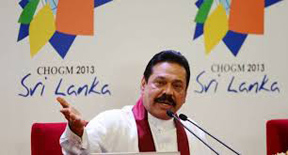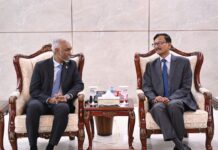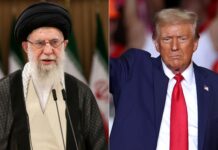 COLOMBO: Sri Lankan President Mahinda Rajapaksa called early elections today, seeking an unprecedented third six-year term in office amid signs of a drop in popularity and demands of his powers to be curbed.
COLOMBO: Sri Lankan President Mahinda Rajapaksa called early elections today, seeking an unprecedented third six-year term in office amid signs of a drop in popularity and demands of his powers to be curbed.
Rajapaksa – who was elected in 2005 and in 2010 – called for snap elections, a full two years before his tenure ends.
His proclamation to seek re-election was issued at an auspicious hour, presidential officials said.
“I am declaring a secret today. I have signed the proclamation calling for the election for re-election for the third time… That is democracy,” Rajapaksa said on state television.
A message on the Rajapaksa’s twitter account said he signed the proclamation declaring his intention to hold a presidential election seeking another term.
Rajapaksa, 69, became eligible to call an election yesterday after completing the mandatory four years in his second term.
Elections Commissioner Mahinda Deshapriya’s office said the presidential proclamation has been received and the due nominations procedure would follow.
The election is likely to be held in early January.
Under the country’s constitution, the president may call elections four years into a term. The Supreme Court upheld this law earlier this month, paving the way for his announcement.
Rajapaksa’s decision came amid signs that he and his party were politically vulnerable. In local elections in September, his United People’s Freedom Alliance suffered its worst losses, losing roughly 20 per cent support among voters.
Yesterday, his ally, the National Heritage Party (JHU), announced that it was exiting the government. As the main party of Buddhist monks, its departure could damage his support in a country where Buddhists comprise nearly 70 per cent of its population of 21.8 million.
The JHU attributed Rajapaksa’s grip on power as a reason for its decision to leave the government, echoing an oft-voiced criticism by the opposition.
Rajapaksa narrowly won elections in 2005. Six years later, he and his party clinched an overwhelming victory, after his government’s success in defeating the LTTE in 2009, ending more than a quarter century of civil war.
However, his presidency has faced increasing scrutiny since 2010 when he changed the constitution, giving himself more executive powers and reversing a campaign promise to scrap a two-term limit.
For the first time since Sri Lanka gained independence in 1978, the president of the island nation has announced he will be seeking an unprecedented third term.
The President has already kicked off his re-election bid with posters carrying his portrait appearing throughout the island since yesterday.
The next step is for the Elections Commissioner to accept nominations.
The candidates must file their nominations between 16 and 22 days from today. A minimum 28-day period will thereafter be allowed for campaigning.
The main opposition challenger to Rajapaksa will be named soon, opposition sources said.–PTI






